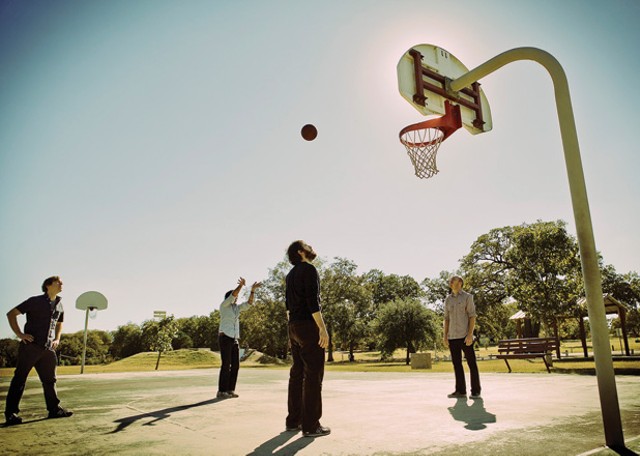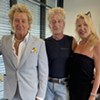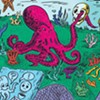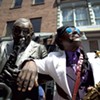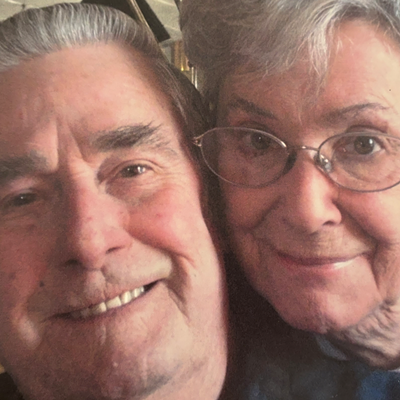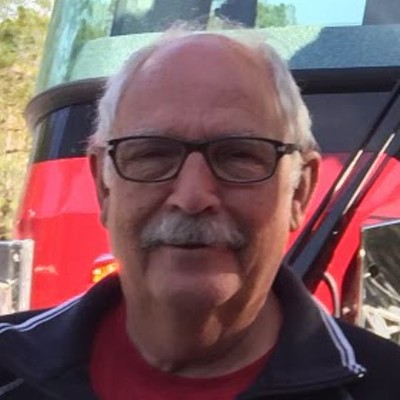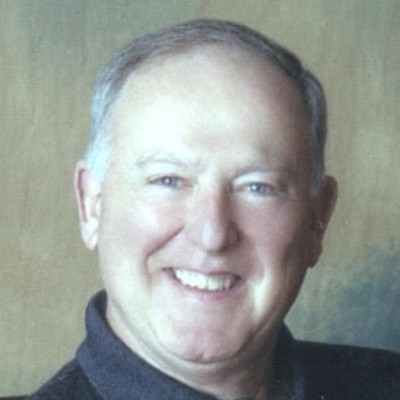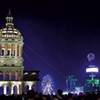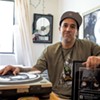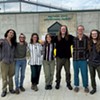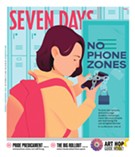Published July 31, 2013 at 7:34 a.m.
When Chris Hrasky left the Chicago suburbs to attend college in Austin, Tex., in the late 1990s, he knew he wanted to start a band. Problem was, he didn’t know anybody there. So the drummer went to a handful of record stores in the city hanging up posters that read: “Wanted: Sad, Triumphant Rock Band.”
“It was meant to be kind of funny, but also serious at the same time,” he says.
Hrasky vetted a few awkward responses from interested musicians before he met with Mark Smith, Munaf Rayani and Michael James over a cheap dinner.
“It was an instant connection,” he recalls. “We hit it off before we even played a note.”
From that connection was born Explosions in the Sky, one of the most successful instrumental rock bands of the last two decades, and a group whose guitar-centric “mini-symphonies” are indeed both triumphant and sad.
EITS are renowned for intricate, dynamic suites that often evoke a narrative arc, even without the benefit of words. That dramatic quality lends itself naturally to soundtrack work. The band is perhaps best known for scoring the 2004 film adaptation of H.G. Bissinger’s book, Friday Night Lights, as well as contributing music to the television series of the same name. The band’s latest project is a collaboration with David Wingo on the soundtrack for the forthcoming film Prince Avalanche, by writer/director David Gordon Green. It will be released on Friday, August 9, but the soundtrack will be available on Tuesday, August 6.
In advance of EITS’ show at the Higher Ground Ballroom on Monday, August 5, Seven Days spoke with Hrasky by phone from his home in Austin.
SEVEN DAYS: Did you have any idea when you hung up those posters that you’d be in the same band some 15 years later?
CHRIS HRASKY: Not really. It’s weird, because I kind of got my “sad triumphant rock band.” That’s what I was shooting for, so I’m pretty lucky. That one decision I made to put up that flyer, and for them to actually call me … these weird little things can literally set the course of your life.
SD: Explosions in the Sky are often referred to as “post-rock.” I gather you’re not a big fan of that term?
CH: To me it seems like a weird way to describe music. I don’t know where it came from. I think it was a critic describing Tortoise or something. It’s fine, but there’s so much stuff that gets lumped into it. Like, OK, I guess us and Tortoise are post-rock. But we don’t sound anything like Tortoise. And they don’t sound like us. So it’s like if you don’t have a singer, you’re just post-rock no matter what it sounds like. It doesn’t make us upset. But we just think of ourselves as a rock band. Those terms don’t help me know what a band sounds like at all.
SD: You should just go with “sad, triumphant rock band.”
CH: Totally!
SD: You write music with a narrative quality, which is interesting given that it is largely wordless. How do you achieve that feel?
CH: It’s hard to say. Our songwriting often happens over an extended period of time, where someone comes up with an idea and then we all build on it. One thing that’s been important to us is that we like our music to move, to have dynamics and weird turns, to have lots of things happening. It’s really a process of trial and error, and you can just tell when it’s working, when the dynamics and transitions are right. And that’s the hardest thing, making it so that those things don’t feel forced, so they’re as fluid as possible. At least for us, that’s hard. And we’re not actually that good at it. We come up with, like, five songs every five years.
SD: Well, sometimes determination is as important as talent.
CH: Sure. You’ve gotta just keep working at it, figuring out what works and if it’s good. That’s a problem whenever we start writing a new record. It’s this confusion, like, “What is it exactly that we do, again?” We have no pattern, really. I guess that’s a good thing. But we sometimes feel like we’re lost in the wilderness when we write new records.
SD: Tell me a little about Prince Avalanche.
CH: We’re really happy with it because there is nothing on it that has the trademarks of Explosions in the Sky. There is a lot of piano, clarinet, acoustic guitars, weird synthesizers. There is not a lot of huge drones with super reverbed-out guitars. We consciously decided to do something different.
SD: Do you have a different process in mind when you’re scoring a film versus when you’re writing for yourselves?
CH: It’s much easier, for one thing. Most of the songs are, like, two minutes, so it doesn’t need to be some massive epic. Also, just the fact that you have a story you’re already following. You can watch a scene and come up with something cool to play over it. So you have a guideline. Whereas on our records, we’re just taking shots in the dark. On a soundtrack, the story we’re always looking for in our songs is already presented to us.
SD: So you’re about to tour with Nine Inch Nails … um, I guess I don’t really have a question.
CH: [Laughs] Yeah, a couple of months ago our manager asked if we wanted to go on the road with Nine Inch Nails and that was that. We didn’t really have any intention of touring this fall, but I think it’s going to be an interesting experience. [Trent Reznor] is definitely someone we respect. I guess he specifically asked us to do it. He doesn’t strike me as someone who would be, like, “Yeah, dude. Bring whoever.” He’s serious about what he does, so to have him ask us is great.
SD: Do you worry about how the band will play with the NIN crowd? You guys are pretty different, stylistically.
CH: I don’t know if they’ll be into us or not. But at the very least it will be a fascinating experience. And we’ve never played in sports arenas. We’ve played for big crowds at festivals. But somehow, because it’s indoors, arenas seem crazier to me. It’s more intimidating playing for 20,000 people in a basketball arena than playing for 40,000 at a festival, for some reason. But we’re all big NBA fans, so playing the Palace at Auburn Hills, the Staples Center, we’re excited about that, to actually work in famed basketball pavilions.
More By This Author
Comments
Comments are closed.
From 2014-2020, Seven Days allowed readers to comment on all stories posted on our website. While we've appreciated the suggestions and insights, right now Seven Days is prioritizing our core mission — producing high-quality, responsible local journalism — over moderating online debates between readers.
To criticize, correct or praise our reporting, please send us a letter to the editor or send us a tip. We’ll check it out and report the results.
Online comments may return when we have better tech tools for managing them. Thanks for reading.



































